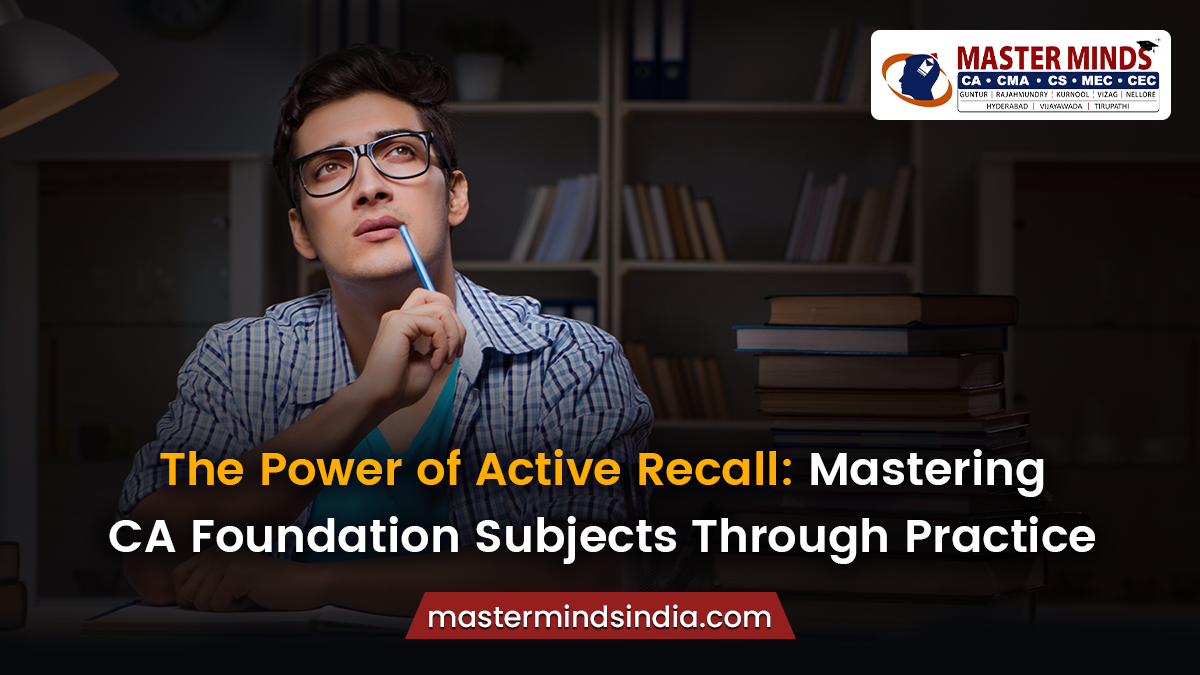Blog
The Power of Active Recall: Mastering CA Foundation Subjects Through Practice

Success in the CA Foundation exam isn’t just about studying more—it’s about remembering better. Research shows that active recall, a technique where you actively try to remember information, can improve retention by 50% compared to passive studying. This means no more last-minute cramming or forgetting answers in the exam hall.
Active recall helps you retrieve information quickly under pressure, just like you’ll need to do in the exam. In this article, we’ll explain how to use this powerful technique for Accounting, Law, Mathematics, and Economics so you can study smarter, remember more, and improve your performance.
Understanding Active Recall
Active recall is a learning technique that involves retrieving information from memory without the aid of notes or textbooks. Unlike passive review methods, where you might simply re-read your notes or textbooks, active recall challenges your brain to actively engage and retrieve information. This process strengthens neural connections, leading to better retention and deeper understanding.
Why Active Recall Works
Enhances Memory Consolidation:
Active recall forces your brain to retrieve information, which helps consolidate it into long-term memory. This process is more effective than passive review because it involves active engagement with the material.
Identifies Knowledge Gaps:
By testing yourself on the material, you can identify areas where your understanding is lacking. This helps you focus your study efforts more effectively, targeting your weaknesses and reinforcing your strengths.
Promotes Efficient Learning:
Regular use of active recall minimizes the need for last-minute cramming by ensuring that information is repeatedly reviewed and reinforced over time.
Strategies for Implementing Active Recall
Create Effective Flashcards
Flashcards are a staple tool for active recall. Here’s how to make them work for you:
- Focus on Key Concepts: Create flashcards that focus on essential terms, definitions, and concepts. Each card should have a question on one side and the answer on the other.
- Use Spaced Repetition: Implement spaced repetition by reviewing your flashcards at increasing intervals. This technique ensures that you revisit information just as you’re about to forget it, reinforcing your memory.
- Keep It Simple: Limit each flashcard to one question and one answer. This simplicity helps prevent cognitive overload and ensures focused learning.
Incorporate Self Testing
Self-testing is a powerful form of active recall that can significantly boost your exam performance:
- Practice Past Papers: Regularly practice with past CA Foundation exam papers. Simulate exam conditions by timing yourself and answering questions without referring to your notes.
- Use Online Quizzes: Leverage online quiz platforms that offer practice questions related to CA Foundation topics. These quizzes often come with instant feedback, helping you gauge your understanding.
- Form Study Groups: Discuss and quiz each other on key concepts with study group members. Teaching others and answering their questions reinforces your own knowledge.
Employ the Leitner System
The Leitner System is a method of using flashcards that incorporates active recall and spaced repetition:
- Sort Flashcards into Boxes: Divide your flashcards into several boxes based on how well you know the material. For example, Box 1 contains cards you find easy, and Box 5 contains cards you struggle with.
- Review According to Difficulty: Review cards from the lower-numbered boxes more frequently and those in higher-numbered boxes less often. This approach ensures that you spend more time on challenging material.
You Can Also Read:
- CA Intermediate New Study Material
- CA Course Duration After 10th, 12th & Graduation
- Tips to Crack CA in First Attempt
- Time-Saving Calculator Tricks for CA Foundation Students
- How to become a CA?
- CA Foundation New Syllabus
- CA Inter New Syllabus
- ICAI CA New Scheme
Practice with Retrieval-Based Learning
Retrieval-based learning goes beyond flashcards and self-testing:
- Summarize from Memory: After studying a topic, close your book and write a summary from memory. This exercise forces you to recall and organize information, enhancing your understanding.
- Teach the Material: Explain concepts to a study partner or even to yourself. Teaching is a powerful way to reinforce your knowledge and identify gaps in your understanding.
Overcoming Common Challenges
While active recall is highly effective, it’s not without its challenges. Here are some common obstacles and tips to overcome them:
- Procrastination: It’s easy to put off self-testing, but consistency is key. Set specific times for active recall sessions and stick to them.
- Initial Difficulty: The initial stages of active recall can be challenging. Embrace the struggle as part of the learning process and stay persistent.
- Overloading: Don’t overwhelm yourself with too many flashcards or questions at once. Gradually increase the complexity and number of items as you build confidence.
CA & CMA Online Classes:

